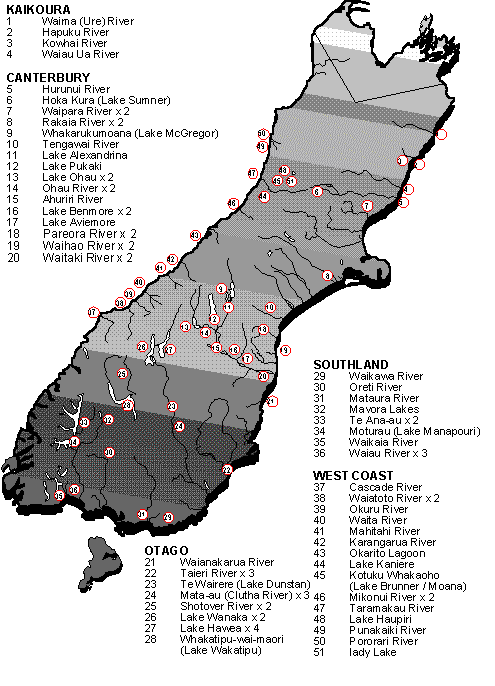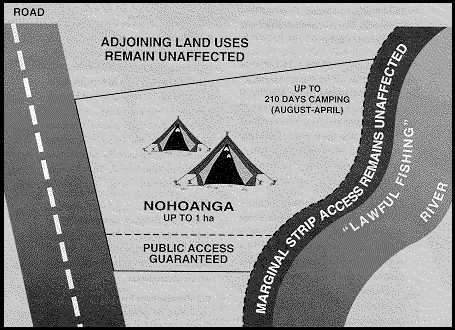Mahinga Kai
The term ‘Mahinga Kai’ was used in the Crown’s Settlement Offer to refer generally to many of the cultural aspects of the redress package. Mahinga kai properly refers to Ngāi Tahu interests in traditional food and other natural resources and the places where those resources are obtained.
Elements of the Settlement Offer which particularly related to Ngāi Tahu Mahinga Kai interests were:
NohoangaCustomary Fisheries ManagementTaonga Species ManagementCoastal space
Nohoanga
Nohoanga provide all Ngāi Tahu with an opportunity to experience the landscape as their tīpuna did, and to rekindle the traditional practices of gathering food and other natural resources, so long an essential part of Ngāi Tahu culture.
The term ‘nohoanga’ (literally ‘a place to sit’), traditionally referred to the seasonal occupation sites which were an integral part of the mobile lifestyle of the tīpuna, as they moved around Te Waipounamu in pursuit of various food and other natural resources. This traditional concept was given contemporary effect in the Crown’s Settlement Offer through the provision to Ngāi Tahu of 72 temporary campsites adjacent to lakes and rivers, to facilitate customary fishing and the gathering of other natural resources (see map).
The Crown’s Settlement Offer provided that Nohoanga:
- Are entitlements to occupy temporarily and exclusively an area of lakeshore or riverbank for the purposes of lawful fishing and the gathering of other natural resources.
- May be used for up to 210 days a year between mid-August and the end of April.
- Are approximately one hectare in size, are set back from marginal strips and will are sited so as not to interfere with existing public access or use.
- Are subject to all legislation, bylaws and regulations, and land and water management practices such as weed, pest and river control. They are issued on a ten year basis and will be automatically renewed, provided that users leave the sites in a good and tidy condition after use.


Customary Fisheries Management
These provisions enable Ngāi Tahu to have greater access to customary fisheries of importance to the tribe and greater input into the management of those fisheries.
There were eight separate but inter-connected elements within the Customary Fisheries section of the Crown’s Settlement Offer. Many of these give effect to work which has gone on in this area over many years.
These elements are:
- Acknowledgement – The special Ngāi Tahu relationship to a number of ‘taonga’ fish species, being species currently only managed for conservation values, were acknowledged by the Crown (species are: Kowaro/Canterbury mudfish, Kaeo/Sea tulip, Koeke/Common shrimp, Taiwharu/Giant kokopu, Piripiripohatu/Torrentfish, Paraki/Common smelt and Kokopu/Giant bully).
- Advisory Committees – Te Rūnanga o Ngāi Tahu will be recognised as an advisory committee to the Minister of Fisheries and the Minister of Conservation, and must be consulted. The Ministers must have particular regard to the advice of Te Rūnanga in relation to the management of the taonga fish species referred to above.
- Customary Kaimoana Regulations – The Crown’s Settlement Offer included an undertaking to put in place regulations providing for the management of customary marine fisheries within three months after the settlement was finalised through legislation.
- Customary Freshwater Fisheries Regulations – Regulations similar to the Kaimoana Regulations will be developed for customary freshwater fisheries managed under the Conservation Act. These were to come into effect no later than two years after the Settlement Legislation is passed.
- Non-commercially Harvested Species – Seven species not currently taken under commercial permits will be formally excluded from commercial fishing (species are: Toheroa, Karengo/Sea Lettuce, Rimurapa/Bull kelp, Kanakana/Southern lamprey, Kakahi/Freshwater mussel and Waikōura/Freshwater crayfish). In addition to complying with existing legislative requirements, the Minister of Fisheries would have to recognise and provide for the views of Ngāi Tahu before changing that status.
- Shellfish Quota – Should certain shellfish species ever be introduced into the Quota Management System, Ngāi Tahu will have a right of first refusal to purchase up to 40% of quota in each species at market price. This is in addition to the 20% of quota which must be provided to the Treaty of Waitangi Fisheries Commission for allocation to iwi (species are: Pipi/Kakahi, Tuatua, Tuaki/Cockle, Pupu/Mudsnail and Kuhakuha/Surfclam).
- Temporary Closure – Provisions which used to exist in the Fisheries Act to allow the Minister to temporarily close specific fisheries (thereby giving effect to rāhui) will be reintroduced.
- Eel Management Plan – In the Settlement Offer, the Crown confirmed its general support for the South Island Eel Management Plan (formulated by Ngāi Tahu, northern South Island iwi and non-Māori commercial and non-commercial eel fishers) and has undertaken to implement certain specific aspects of the plan.
Taonga Species Management
” Through close contact with Ngāi Tahu over species management issues, DoC hopes to improve its relationship with Ngāi Tahu and to improve its understanding of species management.”
(Department of Conservation September 1997)
Through the Crowns Settlement Offer, the special relationship Ngāi Tahu has with 49 bird species, 54 plant species and 6 marine mammal species was recognised and acknowledged. Ngāi Tahu was offered membership to groups involved in threatened species management and will be provided with information about species management programmes. Those responsible for the management of species are required to consult with and have particular regard to Ngāi Tahu views about any management proposal. The protected status of endangered species, such as kakapo and yellow-eyed penguin will not be affected.
Te Rūnanga o Ngāi Tahu has a role as an adviser to Fish and Game Councils in relation to the management of native game birds. Fish and Game Councils are encouraged by the Minister of Conservation to co-opt onto their regional boards a person nominated by Ngāi Tahu, and to enter into Memoranda of Understanding with Ngāi Tahu, to assist in the development of a stronger future working relationship.
Coastal Space
” … these provisions will ensure that Ngāi Tahu will be guaranteed access to future Crown allocations of coastal space.”
The Crown’s Settlement Offer provided that if ‘coastal tendering’ is ever instituted within the Ngāi Tahu Takiwā, authorisations for 10% of the space tendered, of no less than fair average quality, will be made available to Te Rūnanga o Ngāi Tahu at market value.
Coastal tendering is a process under the Resource Management Act which is available to the Minister of Conservation where there is competition for the use of coastal space. It prevents any resource consent being granted unless the applicant has first tendered for, and obtained, an ‘authorisation’ from the Minister.
Because the coastal tendering mechanism has never been used, and might never be used, a ‘fall-back’ provision will ensure that essentially the same 10% guarantee to Ngāi Tahu is carried over into any other mechanism that the Crown might use to allocate coastal space in the future.
Five areas of the coast (Kaikōura, Banks Peninsula, Otago, Foveaux Strait/Rakiura and Fiordland) will also be Statutory Acknowledgement areas as described above. The Ministry for the Environment will be required to have particular regard to issues of concern for Ngāi Tahu when carrying out its monitoring functions under the Resource Management Act in relation to coastal space within the Ngāi Tahu takiwā.
The Coastal Marine area is traditionally a very important mahinga kai area for Ngāi Tahu and these provisions will ensure that Ngāi Tahu will be guaranteed access to future allocations of coastal space. The tribe will also play an active part in future allocation and management decisions relating to the coastal zone.